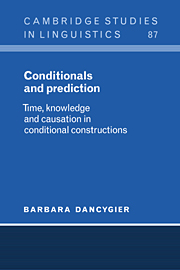Book contents
- Frontmatter
- Contents
- Acknowledgments
- 1 Conditionals as a category
- 2 Prediction and distance: time and modality in conditional clauses
- 3 Relations between the clauses in conditional constructions
- 4 Knowledge and conditional protases
- 5 Conditional clauses: form and order
- 6 If and other conditional conjunctions
- 7 Conclusion: prototypical conditionality and related constructions
- Bibliography
- Index of names
- Subject index
1 - Conditionals as a category
Published online by Cambridge University Press: 22 September 2009
- Frontmatter
- Contents
- Acknowledgments
- 1 Conditionals as a category
- 2 Prediction and distance: time and modality in conditional clauses
- 3 Relations between the clauses in conditional constructions
- 4 Knowledge and conditional protases
- 5 Conditional clauses: form and order
- 6 If and other conditional conjunctions
- 7 Conclusion: prototypical conditionality and related constructions
- Bibliography
- Index of names
- Subject index
Summary
Constructions, conventional meaning, and the grammar of conditionals
This book is an attempt to provide a description of a certain fragment of the grammar of English, namely, conditional sentences. By “conditional,” I will mean primarily the sentences so labeled by grammarians (rather than logicians): complex sentences, composed of the main clause (sometimes also called q, or the apodosis) and a subordinate clause (p, or the protasis). The subordinate clause is introduced by a conjunction, the least marked of English conditional conjunctions being if.
The analysis of conditionals attempted here will focus on providing an explanation of how aspects of conditional form give rise to a variety of meanings that conditional sentences express. That is, following the framework of cognitive linguistics, I will not treat the “grammar” as an autonomous formal description of linguistic structure, but rather as a representation of the speaker's knowledge of linguistic convention. In the cognitive approach (advocated by Fillmore 1977, 1982, Lakoff and Johnson 1980, Langacker 1987, 1991a, 1991b, Lakoff 1987, Fillmore, Kay, and O'Connor 1988, Fillmore and Kay 1994, and many others), it is not possible to speak of grammar in isolation from meaning, on the contrary, grammar is meaningful and essentially symbolic in nature. In Langacker's Cognitive Grammar, for example, lexicon, morphology, and syntax form “a continuum of symbolic units serving to structure conceptual content for expressive purposes” (Langacker 1987: 35).
- Type
- Chapter
- Information
- Conditionals and PredictionTime, Knowledge and Causation in Conditional Constructions, pp. 1 - 24Publisher: Cambridge University PressPrint publication year: 1999



